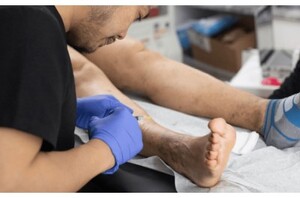Comprehensive Guide: Varicose Veins Treatment
Body
Varicose veins are a common medical condition that affects many people, especially women. They are characterized by twisted, swollen veins that appear just below the skin's surface. In this blog post, we will discuss everything you need to know about varicose vein treatment, When to see a Vascular Doctor or what do vein centers do, including its symptoms, risk factors, and more.
What is a varicose vein?
Large, twisted veins that are visible under the skin are called varicose veins and are most commonly found in the legs. They are caused by malfunction of the veins' regulating valves. When these valves don't work properly, blood collects in the veins, causing them to swell and twist.
Symptoms of Varicose Vein
While some people may have only minor symptoms, others may feel unbearable pain. Discomfort, pain, and swelling in the leg are the most common symptoms. In addition, ulcers or discoloration may appear on the skin covering the veins.
Vein specialist?
What Kind of Doctor is a Vein Specialist? There are several types of doctors who can treat varicose veins, including phlebologists, interventional dermatologists, dermatologic surgeons, radiologists, and primary care physicians.
When to See a Doctor
If you are experiencing pain, swelling, or discomfort due to varicose veins, you should see a vein specialist. These are common conditions that can be treated with laser surgery, endovenous laser treatment, foam sclerotherapy, RFA, Venaseal or vein injections. However, you should talk to a doctor to diagnose the condition and choose the most effective course of treatment. Sometimes, the best ways to relieve symptoms are to wear compression stockings and make lifestyle changes.
Risk Factors
These factors can increase your risk of developing varicose veins, including:
- Genetics
- Age
- Gender
- Family history
- Pregnancy
- Obesity
- Lack of physical activity
- Standing or sitting for long periods
Diagnosis
A doctor specializing in veins will perform a physical examination to detect varicose veins and may suggest a color Doppler scan to determine the severity of the disease. The doctor will also discuss your symptoms and medical history to find out the underlying cause of the condition.
What are the treatment options for varicose veins?
Once diagnosed, the doctor may recommend the best treatment options, including laser, RFA, Venaseal or sclerotherapy.
Varicose Vein and Gyming
Gymming or engaging in any kind of intense physical activity can increase the pressure on the veins and worsen the condition of varicose veins. To improve blood circulation and reduce the risk of complications, it is necessary to wear compression stockings during exercise. However, suppose the symptoms of varicose veins persist. In that case, it is advisable to consult a vein specialist for an accurate diagnosis and treatment plan.
Varicose veins and pregnancy
Most pregnant women experience swelling in their legs or varicose veins. They should see a vascular specialist. Vascular specialists begin treating them with medications or compression stockings, and if necessary, minimally invasive treatments such as laser or RFA can be performed during pregnancy.
Is varicose vein surgery covered under health insurance?
Patients seeking varicose vein surgery may ask if their health insurance will pay for such an expensive medical procedure. Are varicose veins covered by insurance?
But, Varicose vein surgery is typically covered by health insurance policies. However, the exact policy and insurance provider will determine the level of coverage. You must confirm the terms and scope of your insurance coverage with your provider before receiving any medical treatment. Understanding your insurance coverage can help you make wise choices and save on unexpected costs.
Conclusion
In conclusion, the therapies for varicose veins provide an innovative and successful means of managing this prevalent vein disease. These treatments have the potential to improve patient outcomes while minimizing discomfort and recovery time.
When you choose vein centers, you get access to a comprehensive health system.
They are also very individualized and offer a variety of treatment options. If you have varicose veins, it is important to consult a qualified vascular specialist who can assess your condition and recommend the most appropriate treatment plan.







Comments